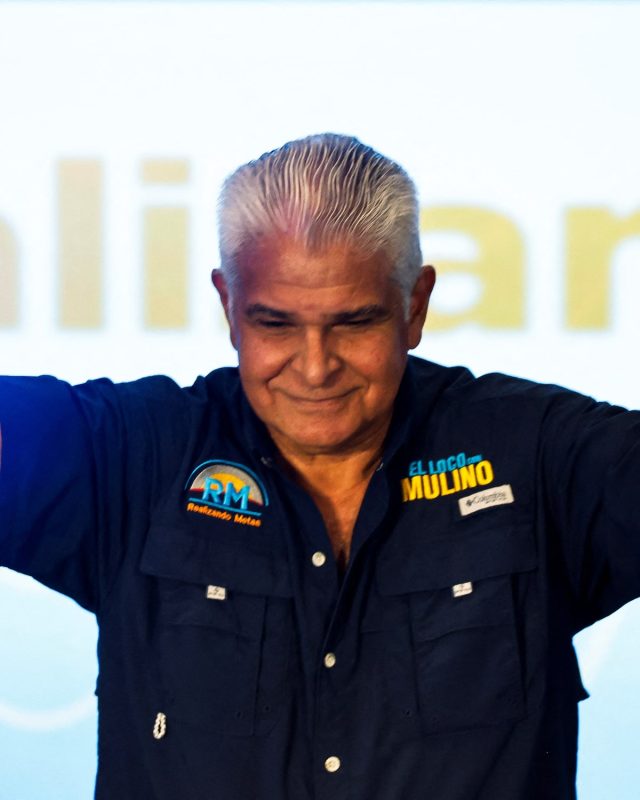PANAMA CITY, (Reuters) – Panama’s former security minister Jose Raul Mulino on Sunday stormed to victory in a presidential poll dominated by his old boss, the popular ex-leader Ricardo Martinelli, who buttressed his campaign despite being holed up in Nicaragua’s embassy.
Mulino, 64, was one of the favorites for the presidency after he stepped in to replace Martinelli on the ballot when the former president was barred from running due to a money laundering conviction.
“Mission accomplished, damn it,” Mulino told his supporters to loud cheers and applause. “To Ricardo Martinelli, friend, mission accomplished as well.”
Mulino said his government would be pro-investment and pro-business and said the Central American country would honor its debts, but also vowed to not forget the poor.
“I promise to the country at this time to put together, to establish, a government of unity as soon as possible,” Mulino told electoral officials earlier as they video called him to confirm he had won the presidency.
In a strange election campaign, Martinelli played a key role drumming up support for Mulino from Nicaragua’s embassy in Panama’s capital, where he sought asylum. Many voters saw Mulino as a proxy for Martinelli, though opponents called him a puppet of the former president.
Nicaragua granted Martinelli asylum but Panamanian authorities have blocked him from leaving the country. Mulino visited Martinelli at the embassy after casting his vote on Sunday.
Mulino, a former lawyer, was declared winner having secured about 34% of the ballots tallied with over 90% of the total vote counted. Ricardo Lombana, who trailed in second place with about 25% of the vote, congratulated Mulino on his victory.
DAUNTING TASK
Mulino, a pro-business right-wing politician who served as interior and security minister during Martinelli’s administration from 2009 to 2014, faces a daunting task of mending social divisions and regaining the faith of an electorate fed up with political graft.
Among his top priorities will be fixing Panama’s pressing economic problems, tackling corruption, and restoring the country’s reputation as an investment haven.
“We know that now as president he can fix the country,” said Hayde Gonzalez, 46, a medic who danced with her daughters in the center of the capital upon hearing Mulino was pulling ahead as votes were counted.
“There will be more security and the economy will recover,” she added.
Mulino has promised to usher in prosperity through ambitious infrastructure investment and a higher minimum wage, while suggesting he would keep Martinelli out of jail.
Magali Rosa, 60, a retiree, said she voted for Mulino because she felt he could bring more jobs and improve security, and that during the Martinelli government there was “a lot of money” for everyone.
Mulino will inherit the controversy surrounding a giant copper mine. The Cobre Panama mine, which accounted for about 1% of total copper supply, was ordered shut last year after a government contract with Canadian miner First Quantum was deemed unconstitutional by the Supreme Court.
Many Panamanians took to the streets to protest against the mine, which opponents argued lacked environmental guarantees and was riddled with corruption.
Panama’s next government will also have to contend with a troubled pension fund system, high levels of public debt and the loss in income from the closure of the mine, which accounted for about 5% of gross domestic product.
Corruption has become a hot-button issue for voters. Local media has recently reported on generous student loans and scholarships granted to the children of politicians and wealthy, high-profile families.
After a record 520,000 migrants last year crossed the treacherous jungle that connects Panama and Colombia, known as the Darien Gap, migration is also on voters’ minds. Some candidates have vowed to open up the path, which could increase migration flows into Panama, while others want to boost controls to shut it down completely.
The next administration will also inherit problems faced by the Panama Canal, which saw revenues tumble after it was forced to cut ship crossings due to a prolonged drought.
Mulino will take office on July 1 for a five-year term.
